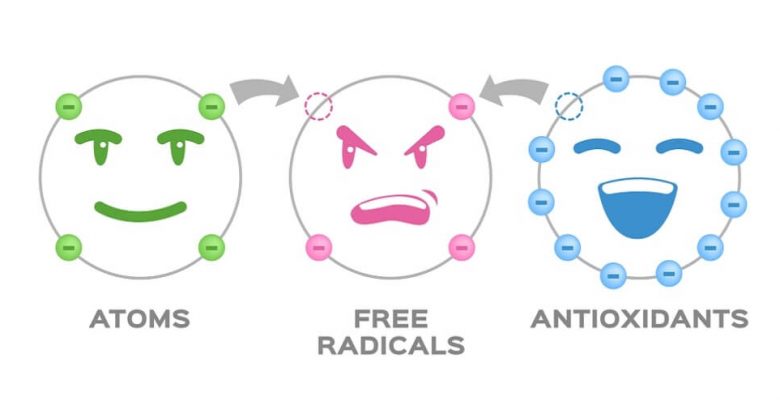Antioxidant Supplements

Currently, the most effective means of treating PD is by replacing dopamine deficiency with a synthetic dopamine medication or a drug that increases the amount of dopamine used by neurons. This synthetic dopamine drug can reverse PD symptoms, prolong patients’ abilities to stay independent, and increases survival. Researchers suspect that the synthetic dopamine drug‘s potential to generate free radicals causes further treatment, PD patients develop neurological complications and about 40 percent will develop dementia. Researchers suspect that the synthetic dopamine drug‘s potential to generate free radicals causes further neuron degeneration during long-term treatment.
Holistic doctors suggest the use of adequate levels of dietary antioxidants in the hope of reducing the potential toxic side effects of long term use of the synthetic dopamine drug. However, studies involving PD patients who supplemented with antioxidants while taking the synthetic dopamine drug have not shown much success. I believe the lack of success stems from the fact that all the antioxidants used in these studies were man made isolated nutritional ingredients such as vitamins Beta Carotene, E and C. On the other hand, whole food antioxidant supplements can neutralize free radicals and protect cells from oxidative injury.
Whole food Antioxidants and Parkinson’s Disease:
Because free radicals have been implicated in PD, antioxidants should, in principle, reduce the risk of neuron degeneration and dopamine oxidation.
Antioxidants, either that made in cells or absorbed from the diet, neutralize free radicals or protect cells from oxidative injury. Among the antioxidants found inside cells are enzymes, glutathione, and CoQ10. Dietary antioxidants include vitamins C and E, flavonoids, carotenoids, and organ sulfur compounds such as those in garlic. Also important are trace minerals including copper, manganese, selenium and zinc, which are essential for antioxidant-enzyme function.
Your daily consumption of fruits and vegetables provide you with much of the beneficial antioxidants. However, because we do not know the quality of the soils from which our commercial or organic fruits and vegetables are grown, we cannot guarantee that we are totally protected from free radical damage. This is why it is so important to supplement with antioxidant vitamins.
Antioxidant vitamins are some of the most important supplements because of their different abilities to protect proteins, lipids, and DNA leading to reducing the risk of neuron degeneration and dopamine oxidation.
Why whole foods are the best antioxidant supplements:
Most people take single antioxidant vitamins, such as Vitamins C, E and Beta Carotene. You are far better off using whole food antioxidants to nourish and protect your brain neurons because whole food antioxidants contain the two types of antioxidants – the nutrients and their natural enzymes (man-made supplements do not).
The antioxidant nutrients (such as vitamins A, C and E) are derived from the diet and have their primary effect while circulating in the blood outside of the cells. The antioxidant enzyme system (super oxide dismutase “SOD”, catalase and others found naturally in foods such as glutathione) is produced by the body inside and outside of the cells. This gives the antioxidant enzyme system a much greater advantage in controlling free radicals because free radical production occurs primarily inside the cell.
One of the best antioxidants on the market today is a supplement made from organically grown wheat sprouts, wild-crafted blue green algae and red sea algae. Three powerful foods are in this one supplement. This supplement is a whole food full spectrum antioxidant.
The wheat sprouts, wild-crafted blue green algae and red sea algae whole food antioxidant supplement is the most effective first-line-of-defense against free radicals. It supplies the skin with antioxidant nutrients AND natural enzymes. The effectiveness of this product has been proven through 10 years of animal studies at Indiana State University and Wilkes University (contact me below if you would like a copy of this research).
Being a whole food supplement, the wheat sprouts and algae not only contain the highest amount of antioxidant enzyme activity available today in any antioxidant supplement, but also contain every single coenzyme factor naturally occurring within the sprouts and algae. This is very important, for as with any nutrient, enzymes do not work alone. The overall synergistic effect of having all of the enzymes together with vitamins and minerals instead of being isolated, as in many man-made antioxidant supplements, is a big reason why the wheat sprouts and algae supplement is able to deliver one million units of total antioxidant enzyme activity!
Another Antioxidant to consider in your nutritional supplementation program:
Coenzyme Q10 (CoQ10). The natural main approach for improved treatments of PD has been to prevent mitochondrial oxidative damage by the use of CoQ10.
CoQ10 is a component of the mitochondrial electron transport system and of energy production. It is also an antioxidant that, in animal studies, appears to provide neuroprotection.
If neurons have a deficient mitochondrial transport system, they will conceivably produce more free radicals. Researchers have suggested this as a cause of increased oxidative damage in PD patients. In animal models of neurodegenerative diseases, impaired mitochondrion has been seen in the substantia nigra and in platelets. Oral CoQ10 treatment was found to protect the nigra and stratum of mice treated with MPTP; a free radical- producing pesticide that selectively damages the brain’s nigrostriatal dopamine system.
Platelet levels of CoQ10 are low in patients with early stage PD, and CoQ10 is well tolerated. A pilot study at the University of California at San Diego tried to link changes in mitochondrial transport with altered PD motor activity. Researchers gave 15 PD patients 200 mg CoQ10 one to four times daily for a month. A trend for improvement in the mitochondrial transport system activity was noted.
The antioxidant supplement I recommend has a remarkable combination of organic flaxseed oil providing a rich source of Omega-3 essential fatty acids, wild-crafted blue green algae, mechanically extracted carotenoids from red beta algae, fennel, rosemary, cinnamon, and ginger.





